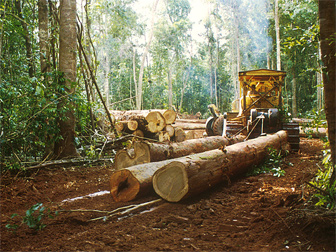China’s wood industry fueled by illegal log imports from rainforest countries
China’s wood industry fueled by illegal log imports from rainforest countries
mongabay.com
February 29, 2008
|
|
While China has improved management of its forestry sector, expanding forest plantation cover and banning harvesting of natural forests, China’s recent growth as wood-products exporter is built on timber imports — much of which are illegal — argues a researcher from the Smithsonian Tropical Research Institute in a letter to Science.
Noting that Chinese imports quadrupled over the past decade — from an estimated 12.5 to 45 million cubic meters — Dr. William F. Laurance says much of the growth in China’s timber supplies has come in unprocessed logs from developing countries, which offer relatively economic benefits to timber-exporting nations and are often linked to illegal trade.
“Most logs imported into China are effectively stolen, with no payment of government royalties to exporting nations or environmental control over harvest operations. At least 80% of Chinese timber imports from Brazil, Cambodia, Cameroon, Congo-Brazzaville, Equatorial Guinea, Gabon, Indonesia, Myanmar, Papua New Guinea, and the Solomon Islands are illegal, according to recent estimates, with somewhat lower values (50 to 60%) for Malaysia and Russia,” writes Laurance. “Unprocessed logs are easy to acquire and smuggle, and corruption in the log trade is far more prevalent than that for processed forest products.”
 Photo by William F. Laurance |
Laurance says the illegal timber trade is driving forest degradation and deforestation in the tropics by providing impetus for road building which “increases access to forests for slash-and-burn farmers, hunters, and land speculators that in turn destroy or severely degrade forests and their wildlife.”
Laurance argues that developed countries are playing a key role in the destruction: it is their demand for cheap wood products that is fueling China’s wood products industry. As such, says Laurance, efforts to rein in the illegal timber trade will have to target consumer preferences in wealthy nations.
“Chinese wood products corporations will have little incentive to alter their predatory behavior so long as consumers in wealthy nations blithely continue buying their products,” he concludes.
Related articles
China calls for sustainable logging by Chinese firms overseas. China unveiled a draft sustainable forestry handbook for Chinese companies operating overseas. The move comes as the country faces increasing criticism from environmentalists who say China’s booming demand for timber and other materials is destroying the world’s tropical forests.
Home improvement giant bans illegal wood products. B&Q, the third largest retailer of home improvement materials, announced that within three years, all Brazilian wood products sold in China would come from certified sources. B&Q has 60 stores in China.
China’s demand for hardwood drives illegal logging says Greenpeace. Environmental group Greenpeace said on Tuesday China should take responsibility for illegal hardwood logging in Southeast Asia which supplied the raw materials for Chinese exports to the West.
China needs 5 million cubic meters more of tropical timber by 2010. China needs 5 million cubic meters more of tropical timber by 2010 according to the September 15-30 ITTO Tropical Timber Market Report, a publication published by the International Tropical Timber Organization. China is already the world's largest consumer of tropical wood, importing more than twice the volume of tropical logs as India, the second largest importer on the list.
Timber hungry China moves into Africa. With its projected growth rates, China will soon surpass the United States in wood consumption. This voracious appetite for timber is threatening tropical forests around the globe but nowhere is this more apparent than in Africa where China is increasingly focusing its development efforts and adding fuel to a booming trade in illegally harvested timber.